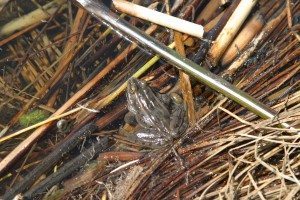The other day, as I toured the flood zone around the Shoal Lakes with flooded farmer Orval Procter, I couldn’t help but revel in the gorgeous scenery.
It was stunningly beautiful. Still blue waters. Blue skies. A ghost of white along the horizon where the lake was still frozen. Weathered fenceposts draping lines of seaweed covered barb wire across a broad expanse of water and land.
Read Also

Crop profitability looks grim in new outlook
With grain prices depressed, returns per acre are looking dismal on all the major crops with some significantly worse than others.
All around us frogs croaked and the waters were so clean you could see their legs dangling down into the shallow depths. Birdsongs were all around too, and what few puffs of wind came our way whispered past on their way south.
As we checked out one area of flooded pasture, along the sunken road the other way came a quad-driving farmer, who turned out to be the cousin of the farmer I was with.
As he joined us the cousins chatted about the land they’ve lost, but soon got on to discussing the various forms of waterfowl they’ve seen in the area. As they talked, pelicans wheeled in the sky out over the former edge of the lake, a pair of cranes stick-walked across the water near a tree line, and lots of little flappers flitted around us, following their birdy desires.
Beautiful. And the irony that this beauty represented the destruction of much productive pasture and hay land didn’t detract from any of our appreciation.
I have often found this with farmers. The rational, managing side of them complains about deer damage, problems with bears and other predators, migrant bird problems. But they always seem to love the critters that cause them economic problems regardless, and often stop to admire them.
It might seem ironic, but since part of loving farming is loving the independent life surrounded by nature, it makes sense on a fundamental level.





















